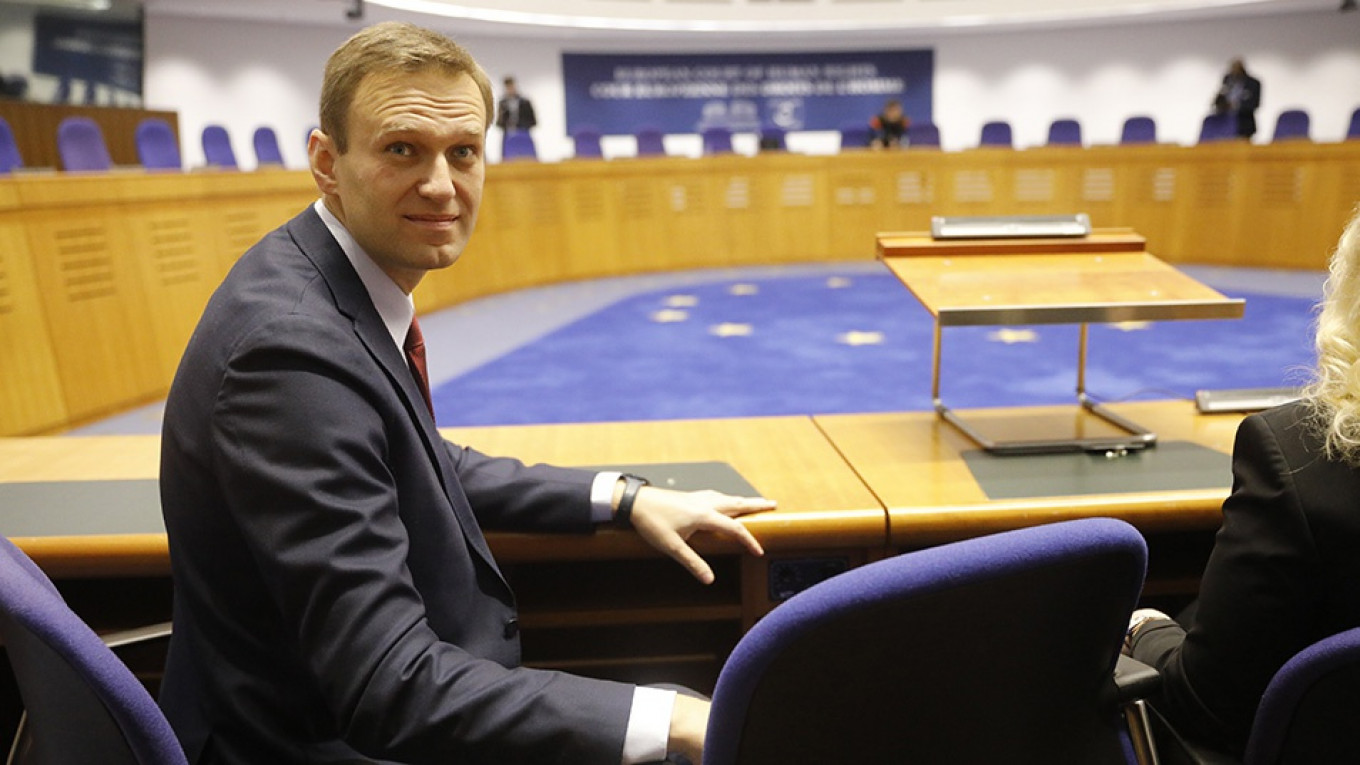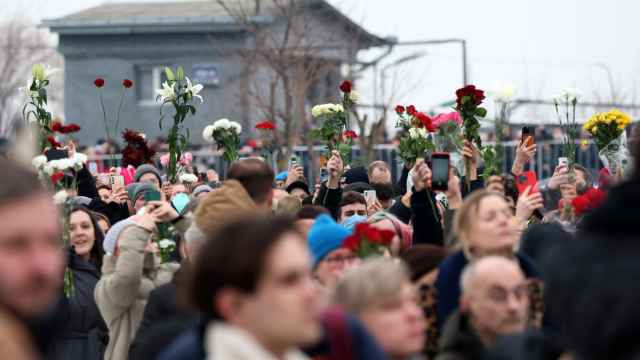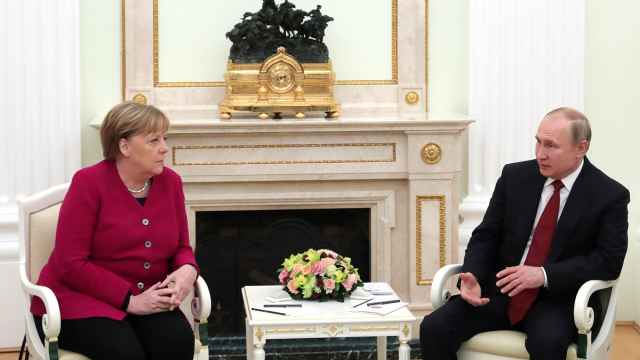The Russian dissident Alexei Navalny has long had a catch-and-release relationship with President Vladimir Putin and his regime. Since 2011, when he became the country’s informal opposition leader, Navalny has spent 192 days in detention, not counting a long spell under house arrest. The prison stays, of seven to 30 days at a time, have mostly occurred in the last two years.
On Thursday, the European Court for Human Rights ruled that arrests in 2012 and 2014 violated Navalny’s rights. This major victory for the political gadfly is likely to bring Russia a step closer to breaking off its remaining ties with European institutions.
The Putin regime has been playing an unpredictable game with Navalny, a lawyer and anti-corruption activist with uncanny skills both as a politician and investigative journalist. The anti-Putin protests in Moscow after the rigged parliamentary election of 2011 drew attention to him as a talented organizer with a large, young following. In 2013, he was convicted on trumped-up graft charges but was unexpectedly handed a suspended sentence. Still, his brother was thrown in jail, apparently as a hostage, and systematic harassment against Navalny and his family intensified.
The regime’s campaign included constant surveillance, attacks from pro-Kremlin activists (one assault damaged Navalny’s eye, requiring surgery) and the constant arrests, usually for organizing unsanctioned protests. In September, Navalny was picked up for another 20 days in detention even as he was released from a stint in government custody.
Navalny complained about seven of the arrests in 2012 and 2014 to the European human rights court, which has had jurisdiction over Russian cases since the country signed the European Convention on Human Rights in 1998, under President Boris Yeltsin. The ruling Thursday asserts that “the authorities were becoming increasingly severe towards Mr. Navalny and that his allegation of being a particular target appeared coherent in the context of a general move to bring the opposition under control." The court pointed out that the repeated arrests violated the convention and said Russia’s regulatory framework had a “structural inadequacy” when it came to the right of peaceful assembly, namely that it shouldn’t be illegal to protest without a government permit.
The European decision won’t end the harassment; Navalny was turned away at the Russian border as he was en route to the court’s headquarters in Strasbourg to hear the ruling. He was forced to pay a large fine related to his 2013 conviction, then finally allowed to make the trip. Russia, however, isn’t likely to pay the 64,000 euros ($72,000) in fines imposed by the European court: In 2015, it adopted a law that allows the government to disregard the court’s rulings if they contradict the constitution.
Nonetheless, Navalny celebrated the ruling, which deemed the Russian authorities’ pseudo-legal campaign against him as a human rights violation. It’s important that the court invoked Article 18 of the Convention on Human Rights forbidding restrictions of basic freedoms for arbitrary reasons, something the Putin regime often does while pretending that it sticks to a legal framework.
Navalny may be one of the last Russians to have recourse to the European court. Given the Kremlin's open disdain for Western institutions and the Western concept of human rights, Russia’s status as a signatory to the European convention is increasingly hard to justify. In March, RIA Novosti, the official news agency, reported, cited unnamed government sources who said Russia could soon renounce the convention because of the “politicized” “double standards” of the European court.
Thursday’s high-profile decision in favor of an opposition figure will inevitably stoke the Kremlin’s desire to get rid of the pesky human rights watchdog. The court has ruled on thousands of Russian cases, often against the government, drawing attention to ugly prison conditions, the shabby treatment of immigrants and the plight of anti-regime activists. There's little benefit for the Kremlin in holding on to remnants of Yeltsin’s ambition to make Russia an integral part of Europe.
After Russia invaded Crimea in 2014, the Council of Europe, the 47-member organization that promotes human rights through a number of conventions, including the one on which the court’s jurisdiction is based, stripped Russia of its vote. Since 2017, Russia hasn’t paid its share of the council’s funding. Last month, Foreign Minister Sergei Lavrov said Russia would withdraw if the council attempted to expel his country for its failure to pay its bills. The Kremlin appears to be looking for a pretext for quitting human rights institutions without appearing to renounce the commitments of Putin's predecessor.
The court is one of the last reasons Russia hasn’t become an outright dictatorship. For example, it hasn't used capital punishment since joining the convention. But, as the national organization of defense lawyers said in a statement earlier this week, there will be no legal obstacles to resuming executions if the convention no longer applies. The defense lawyers also pointed out that European oversight was useful for Russia’s legal and penitentiary systems, and losing it would weaken protections for citizens.
The dehumanizing game the regime has been playing with Navalny shows the Kremlin is less and less concerned about those protections. The dissident has won an important battle, but so far, both he and ordinary Russians appear to be losing the war against a government that treats human rights as a Western imposition.
Leonid Bershidsky is a Bloomberg Opinion columnist covering European politics and business. He was the founding editor of the Russian business daily Vedomosti and founded the opinion website Slon.ru. The views expressed in opinion pieces do not necessarily reflect the editorial position of The Moscow Times.
A Message from The Moscow Times:
Dear readers,
We are facing unprecedented challenges. Russia's Prosecutor General's Office has designated The Moscow Times as an "undesirable" organization, criminalizing our work and putting our staff at risk of prosecution. This follows our earlier unjust labeling as a "foreign agent."
These actions are direct attempts to silence independent journalism in Russia. The authorities claim our work "discredits the decisions of the Russian leadership." We see things differently: we strive to provide accurate, unbiased reporting on Russia.
We, the journalists of The Moscow Times, refuse to be silenced. But to continue our work, we need your help.
Your support, no matter how small, makes a world of difference. If you can, please support us monthly starting from just $2. It's quick to set up, and every contribution makes a significant impact.
By supporting The Moscow Times, you're defending open, independent journalism in the face of repression. Thank you for standing with us.
Remind me later.








